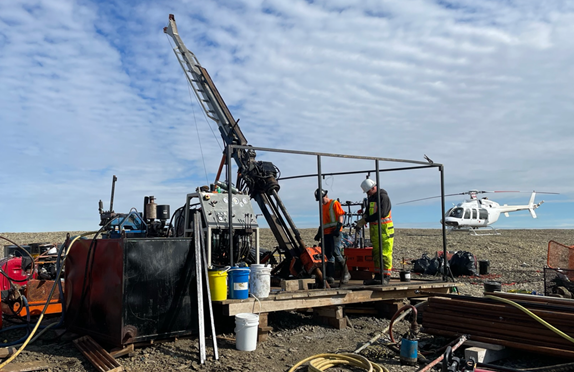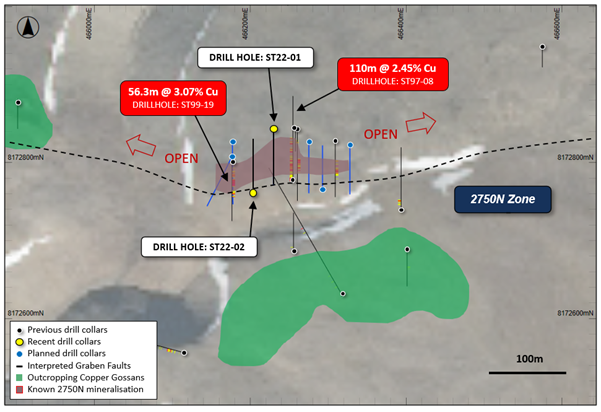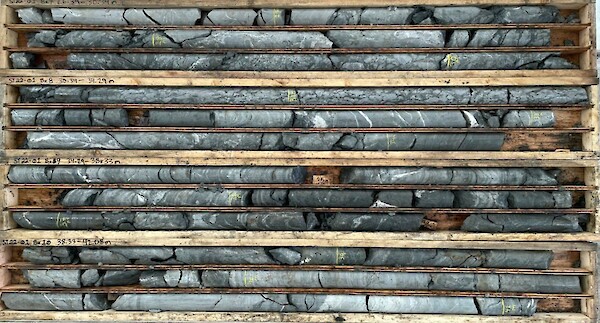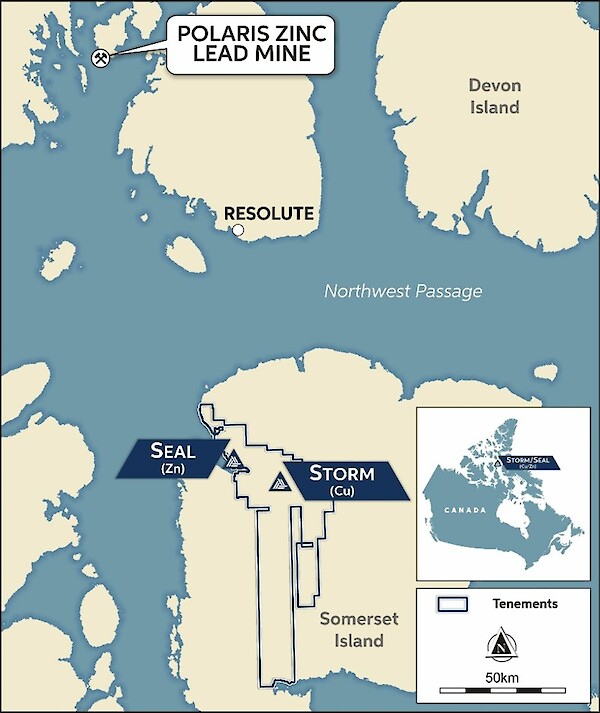News
Aston Bay Announces Thick Intersections of Copper Mineralization in Initial Drillholes at Storm Project, Nunavut
TORONTO, ON, July 25, 2022 – Aston Bay Holdings Ltd. (TSXV: BAY) (OTCQB: ATBHF) ("Aston Bay" or the "Company”) is pleased to announce the excellent visual results confirming the presence of copper mineralization for the first two drill holes completed at the Company’s high-grade Storm Copper Project (“Storm” or the “Project”) on Somerset Island, Nunavut. This is the maiden drilling program for American West Metals Limited (“American West”), who are the project operator, since entering the option agreement with Aston Bay in March 2021.
Highlights
- Visual geological observations of the first two diamond drill holes at the high-grade Storm Copper Project indicate that both holes have intersected extensive copper sulfide mineralization near-surface;
- ST22-01 has intersected 72.1metres (m) core length of mineralization including 23.74m core length of breccia and massive copper sulfides over multiple intervals;
- ST22-02 has intersected 81.22m core length of mineralization including 22. core length of breccia and massive copper sulfides over multiple intervals;
- Drilling at Storm continues with an additional 15-20 diamond drill holes planned to test priority high-grade copper targets, including a number of new electromagnetic (EM) conductors that have the potential to deliver new sulfide copper discoveries; and
- Shallow high-grade copper mineralization at Storm has the potential to support a low-footprint direct shipping product (DSP) operation.
Figure 1: Massive and breccia-filling chalcocite (dark grey/black) in dolomite (light grey) in drill hole ST22-01.
“Drilling at Storm has produced outstanding results in the initial two drill holes, with over 72m of dominantly chalcocite mineralization visible in the core from drill hole ST22-01 and over 81m of similar mineralization visible in ST22-02,” stated Thomas Ullrich, CEO of Aston Bay. “These are significant results and demonstrate the continuity between historical copper intersections at the 2750N Zone, where our partners are working to define a copper resource. Previous ore sorting test work has demonstrated that the area can produce a high-value >53% copper direct ship product, highlighting the potential to support a low cost and low footprint direct ship mining development option.”
Figure 2: Drilling underway on drill hole ST22-01 at the 2750N Zone, Storm Copper Project.
Drill holes ST22-01 and ST22-02 have successfully intersected thick zones of breccia with locally narrow zones of semi massive to massive chalcocite (copper sulfide) hosted within much broader intervals of vein and fracture style copper mineralization. Laboratory assays are pending and required to confirm the copper content in the drill core.
The drill holes are part of the extensional and resource definition drilling program for the 2750N Zone where historical drilling has encountered significant copper mineralization, including 110m core length at 2.45% copper (Cu) from surface (drill hole ST97-08), and 56.3m core length @ 3.07% Cu from 12.2m (drill hole ST99-19). Significantly, the 2750N Zone copper mineralization remains open at depth and along strike with further drilling planned.
The results from ST22-01 and ST22-02 confirm the continuity of the near-surface mineralization in this area and provide strong support for the potential to delineate a shallow, high-grade resource at the 2750N Zone.
The 2750N Zone is the focus of initial resource work to define resources for a potential open-pit direct shipping product (DSP) mining operation. Initial ore sorting test work on mineralization from Storm generated a DSP product grading more than 53% Cu (see news release dated April 11, 2022).
The combination of high-grade and shallow mineralization at Storm provides a potential pathway to a very low footprint, ESG sensitive mining operation scenario with the potential for low initial capital and operating costs.
Figure 3: Plan of the 2750N Zone - Drilling, known mineralization outline, known copper gossans overlaying aerial photography
Drill Hole ST22-01 Details
ST22-01 is the first hole to be completed as part of the 2022 program and was drilled to a downhole depth of 128m.
The drill hole was designed to test the continuity of thick mineralization intersected in historical drill holes ST97-08 and ST99-19. These two historical drill holes are situated approximately 100m apart (Figure 3).
ST22-01 intersected over 72.1m of chalcocite and chalcopyrite mineralization hosted within dolomite of the Allen Bay Formation. This host unit is present throughout the Storm Project area and is comprised of massive-to-thinly bedded dolomicrites (dolomitized limestone).
The mineralization encountered within ST22-01 is comprised of six zones of breccia to massive sulfides hosted within a broad mineralized package of mostly vein and fracture style mineralization. Fracturing and sulfide mineralization are likely controlled by graben formation, which is interpreted to be located immediately south of the 2750N Zone.
Figure 4: Drill core from ST22-01 between 26.39m and 42.08m downhole showing massive and breccia-filling chalcocite (dark grey) hosted within dolomite (pale grey).
The dominant copper mineral observed within ST22-01 is chalcocite, with minor local chalcopyrite and other copper sulfide minerals.
Chalcocite is an important copper mineral due to its high copper content (79.8% copper) and favorable metallurgical properties. The simple mineralogy of the Storm mineralization is a further feature that makes it amenable to producing a high-grade direct shipping product.
Mineralization as observed in ST22-01 is summarized in Table 1. Intersections are expressed as downhole widths and are interpreted to be close to true widths. Visual estimates of sulfide quantity and habit should not be considered a substitute for laboratory assays.
|
Hole ID |
From (m) |
To (m) |
Min |
Description (Sulfide volume within interval) |
|
|
ST22-01 |
19.5 |
22.74 |
cc |
Breccia and cement sulfide-filled fractures (20%) |
|
|
|
22.74 |
24 |
cc/py |
Sulfide in fractures (5%) |
|
|
|
26 |
27 |
cc |
Sulfide in fractures (1%) |
|
|
|
27 |
32.18 |
cc |
Heavily brecciated and vein sulfide (10-20%) |
|
|
|
32.18 |
35.92 |
cc/chpy |
Locally brecciated and minor sulfide veining (2-5%) |
|
|
|
35.92 |
44 |
cc |
Heavily fractured with abundant brecciations, zones of massive sulfide (5-40%) |
|
|
|
44 |
47.66 |
cc |
Minor fractures and blebs of sulfide (5%) |
|
|
|
47.66 |
53 |
cc/chpy |
Abundant veins and breccias with local beds of massive sulfide (10-15%). Chalcopyrite is present as blebs with chalcocite |
|
|
|
53 |
65 |
cc/chpy |
Veins of chalcocite grading into chalcopyrite at 56.5m (2-5%) |
|
|
|
65.4 |
66.3 |
chpy |
High density veinlets and massive sulfide layers (5-40%) |
|
|
|
66.3 |
90 |
chpy/cc |
Fracture and veinlet sulfides throughout unit (1-5%) |
|
|
|
91 |
92 |
cc |
Black and sandy sulfide, rubbly (20-30%) |
|
|
|
92 |
95 |
cc/Cu |
Minor sulfide bands and fractures. Native copper present along some fractures (1%) |
|
Table 1: Description of intervals with visually identified mineralization in drill hole ST22-01. Mineralogy key is cc = chalcocite, chpy = chalcopyrite, py = pyrite, Cu = native copper, az = azurite, ml = malachite
Drill Hole ST22-02 Details
ST22-02 was drilled to a downhole depth of 155m. The drill hole was also designed to test the continuity of mineralization between drill holes ST97-08 and ST99-19.
ST22-02 has intersected similar geology and mineralization to that of ST22-01, suggesting continuity of the main ore zone.
Figure 5: Drill core from ST22-02 between 13.6m and 21m downhole (top image) and between 29.5m and 36.5m downhole (bottom image) showing massive and breccia chalcocite (dark grey) hosted within dolomite (pale grey).
Mineralization observed is summarized in ST22-02. Intersections are expressed as downhole widths and are interpreted to be approximately 75-80% of true width. Visual estimates of sulfide quantity and habit should not be considered a substitute for laboratory assays.
|
Hole ID |
From (m) |
To (m) |
Min |
Description (Sulfide volume within interval) |
|
ST22-02 |
0 |
5 |
ml |
Trace malachite in overburden (1%) |
|
|
5 |
14 |
cc, ml |
Veinlets, occasional breccia, increase in mineralization abundance towards bottom (1-5%) |
|
|
14 |
15 |
cc |
Massive and cemented chalcocite (40-50%) |
|
|
15 |
18.5 |
cc |
Veinlets and fracture filled cemented breccia (1-2.5%) |
|
|
18.5 |
32.4 |
cc, chpy |
Strongly brecciated and veined (5-20%) |
|
|
32.4 |
34.3 |
chpy, bn, cv |
Veinlets of chalcocite with local cemented covellite breccia (5%) |
|
|
34.3 |
35.2 |
cc, cv |
Massive sulfides with dolomite clasts (>50%) |
|
|
36.2 |
38 |
cc/chpy |
Abundant cemented breccia (>50%) |
|
|
38 |
53 |
cc |
Intermittent veinlets and occasional breccia (1-5%) |
|
|
53 |
56.12 |
cc |
Local zones of breccia (5%) |
|
|
61.5 |
63 |
ml, bn, cc |
Occasional veinlets (1%) |
|
|
63 |
64 |
cc, chpy |
Abundant breccias (5-7%) |
|
|
73 |
80.4 |
cc |
Massive dolomite with trace veinlets (1%) |
|
|
82.2 |
82.6 |
cc |
Massive breccia (>50%) |
|
|
82.6 |
83.5 |
cc |
Minor veinlets (1-2.5%) |
|
|
87.5 |
92 |
cc, ml |
Small fractures lined with sulfides and irregular veins (1-5%) |
|
|
97.6 |
104 |
ml |
Trace malachite in vugs in dolomite (1%) |
|
|
133 |
137 |
ml |
Malachite in calcite veins throughout massive dolomite (1%) |
Table 2: Description of intervals with visually identified mineralization in drill hole ST22-02. Mineralogy key is cc = chalcocite, chpy = chalcopyrite, Cu = native copper, az = azurite, ml = malachite, bn = bornite, cv = covellite
|
Hole ID |
Prospect |
Easting |
Northing |
Depth (m) |
Azi |
Dip |
|
ST22-01 |
2750N |
466230 |
8172841 |
128 |
180 |
-50 |
|
ST22-02 |
2750N |
466202 |
8172763 |
155 |
360 |
-65 |
Table 3: Drill hole details
Drilling Continues
The diamond drilling is continuing at the 2750N Zone with drill holes now targeting eastern extensions to the mineralization.
Preparations are also underway for drill testing a number of high-priority EM conductors that were identified by the 2021 fixed loop electromagnetic (FLEM) survey within the Storm Project area.
About the Storm Copper and Seal Zinc-Silver Projects, Nunavut
The Nunavut property consists of 117 contiguous mining claims and six prospecting permits covering an area of approximately 302,725 hectares on Somerset Island, Nunavut, Canada. The Storm Project comprises both the Storm Copper Project, a high-grade sediment hosted copper discovery (intersections including 110m* @ 2.45% Cu from surface and 56.3m* @3.07% Cu from 12.2m) as well as the Seal Zinc Deposit (intersections including 14.4m* @ 10.58% Zn, 28.7g/t Ag from 51.8m and 22.3m* @ 23% Zn, 5.1g/t Ag from 101.5m). Additionally, there are numerous underexplored targets within the 120-kilometre strike length of the mineralized trend, including the Tornado copper prospect where 10 grab samples yielded >1% Cu up to 32% Cu in gossans.
*Stated drillhole intersections are all core length, and true width is expected to be 60% to 90% of core length.
Figure 6: Storm Copper Project, Location Map
Qualified Person
Michael Dufresne, M.Sc., P.Geol., P.Geo., is a qualified person as defined by National Instrument 43-101 and has reviewed and approved the scientific and technical information in this press release.
About Aston Bay Holdings
Aston Bay is a publicly traded mineral exploration company exploring for base metals and gold deposits in Virginia, USA, and Nunavut, Canada. The Company is led by CEO Thomas Ullrich with exploration in Virginia directed by the Company's advisor, Don Taylor, the 2018 Thayer Lindsley Award winner for his discovery of the Taylor Pb-Zn-Ag Deposit in Arizona. The Company is currently drilling the Mountain Base Metals Project in Virginia, exploring the Buckingham Gold Project, also in Virginia, and is in advanced stages of negotiation on other lands in the area.
The Company is also 100% owner of the Storm Project property, which hosts the Storm Copper Project and the Seal Zinc Deposit and has been optioned to American West Metals Limited.
About American West Metals Limited
AMERICAN WEST METALS LIMITED (ASX: AW1) is an Australian company focused on growth through the discovery and development of major base metal mineral deposits in Tier 1 jurisdictions of North America.
They are a progressive mining company focused on developing mines that have a low-footprint and support the global energy transformation.
Their portfolio of copper and zinc projects include significant existing mineral resource inventories and high-grade mineralization that can generate robust mining proposals. The company is commitment to the ethical extraction and processing of minerals and making a meaningful contribution to the communities where our projects are located.
The company is led by a highly experienced leadership team, with strategic initiatives that lay the foundation for a sustainable business which aims to deliver high-multiplier returns on shareholder investment and economic benefits to all stakeholders.
For further information on American West, visit: www.americanwestmetals.com.
FORWARD-LOOKING STATEMENTS
Statements made in this news release, including those regarding the Option Agreement, grant of the Option and the expected closing date, American West’s interest in the Storm Project and its other acquisitions and plans, plans for the upcoming field season, management objectives, forecasts, estimates, expectations, or predictions of the future may constitute “forward-looking statement”, which can be identified by the use of conditional or future tenses or by the use of such verbs as “believe”, “expect”, “may”, “will”, “should”, “estimate”, “anticipate”, “project”, “plan”, and words of similar import, including variations thereof and negative forms. This press release contains forward-looking statements that reflect, as of the date of this press release, Aston Bay’s expectations, estimates and projections about its operations, the mining industry and the economic environment in which it operates. Statements in this press release that are not supported by historical fact are forward-looking statements, meaning they involve risk, uncertainty and other factors that could cause actual results to differ materially from those expressed or implied by such forward-looking statements. Although Aston Bay believes that the assumptions inherent in the forward-looking statements are reasonable, undue reliance should not be placed on these statements, which apply only at the time of writing of this press release. Aston Bay disclaims any intention or obligation to update or revise any forward-looking statement, whether as a result of new information, future events or otherwise, except to the extent required by securities legislation.






